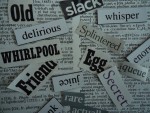 I began using an online dictionary a few years ago—not because I found it more convenient than a paper dictionary, but because my old Webster’s is just too distracting. I would open it up, intending to look up “phaeton,” and right next to it I’d see “phage,” which has nothing to do with “phaeton” but is an interesting word in itself, as is “phatic” on the opposite page. Having also glanced at “phalanstery,” “petrous,” and “petroleum jelly,” I would end up acquiring some interesting bits of assorted information but forgetting which word I’d meant to look up in the first place.
I began using an online dictionary a few years ago—not because I found it more convenient than a paper dictionary, but because my old Webster’s is just too distracting. I would open it up, intending to look up “phaeton,” and right next to it I’d see “phage,” which has nothing to do with “phaeton” but is an interesting word in itself, as is “phatic” on the opposite page. Having also glanced at “phalanstery,” “petrous,” and “petroleum jelly,” I would end up acquiring some interesting bits of assorted information but forgetting which word I’d meant to look up in the first place.
So, yes, I’m easily amused as well as easily distracted. But modern dictionaries are really just the beginning. Besides the words currently in use—400 thousand or so—there are many that have fallen by the wayside. In Forgotten English, Jeffrey Kacirk collects archaic words that are odd, fascinating, and sometimes hilarious. If you’ve read any literature from before the 20th century you may have encountered words like “ferule” or “press-gang.” But others are intriguingly obscure: “galligaskin,” “sockdolager,” “fulluht.”
The thing about Forgotten English is that it’s both a collection of words and a rambling, whimsical history book. In many cases it’s not just the words that have been forgotten, but the things they refer to: occupations, practices or beliefs that no longer exist. “Purl-men,” for instance, were itinerant beer-sellers “who plied their trade on the Thames and other navigable waterways of southern England,” and a “bee-master” was one who “tended hives and performed the essential task of informing an estate’s bees of important household events.” So each entry is at least a paragraph, up to a page and a half long, often incorporating literary excerpts that enlarge on the definitions. It’s fascinating, and it also makes me wonder which of our current practices and their corresponding words will go extinct over the next century or so.
Then again, the assortment of English words in current use is enough for Roy Blount Jr. to have a great deal of fun with. In Alphabet Juice (subtitled The Energies, Gists, and Spirits of Letters, Words, and Combinations Thereof; Their Roots, Bones, Innards, Piths, Pips, and Secret Parts, Tinctures, Tonics, and Essences; With Examples of Their Usage Foul and Savory) he explores derivations of words and discourses on their sounds, meanings, associations, uses and misuses. With its thorough research, idiosyncratic assortment of words, and highly entertaining tangents, this book is highly enjoyable.
Blount especially loves words he calls “sonicky”:
I offer this neologism as an alternative to onomatopoeic or echoic or imitative…I mean the quality of a word whose sound doesn’t imitate a sound, like boom or poof, but does somehow sensuously evoke the essence of the word: queasy or rickety or zest or sluggish or vim.
Thus his comment on the word “cowlick”:
There’s a good word. Even if a cow has never licked your hair. Lick of course is sonicky. And nobody ever said cow wasn’t a good word for a cow. You wouldn’t call a cow a weasel.
I’m not fond of the term “sonicky”—I don’t like the sound of it!—but I share his liking for those sonicky words. They have a just-right quality that gives reading its sensory pleasure; they make writing fun.
Then there’s The Meaning of Liff by Douglas Adams and John Lloyd, which is a word book of yet another kind. On the premise that there are countless familiar situations and experiences for which there are no words, along with countless words hanging around on road signs pointing to towns and villages, they set out to match them up. The result is a lot of silliness along with a lot of keen observations on life.
Some of the place names given definition are amusing in themselves, like Foindle or Uttoxeter (mainly because, being mostly British, they’re someone else’s funny-sounding place names. I grew up in Saskatchewan, where people mention towns like Findlater, Eyebrow and Punnichy with a straight face). What makes the book so brilliant, though, is how well-matched the words and definitions are, like “Fring: The noise made by a light bulb which has just shone its last” or “Luffness: Hearty feeling that comes from walking on the moors with gumboots and cold ears.”
Under “C” there’s a particularly good set of words that describe what people do when they meet in a corridor, beginning with “corriearklet”:
The moment at which two people, approaching from opposite ends of a long passageway, recognise each other and immediately pretend they haven’t.
To avoid awkwardness, people resort to “corriecravie,” approaching each other while pretending ignorance of each other’s presence until the right moment for “corriedoo,” the moment of pretended sudden recognition.
It’s rather fortunate, really, that places like Corriedoo actually exist and can contribute their names to this project. If someone tried to invent names out of thin air, they probably wouldn’t be half as interesting.